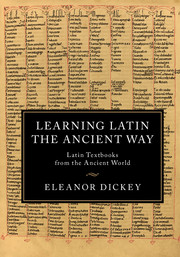2 - Texts
Published online by Cambridge University Press: 05 March 2016
Summary
Colloquia
Colloquia are bilingual dialogues and narratives designed to be used at an early stage of language learning. The text is arranged in two narrow columns, with the language the students already know on the right and the one they are learning on the left; the two languages match line for line, so that whenever students get stuck they can easily find the translation of the word or phrase that confuses them. This line-for-line or “columnar” translation system is more flexible than a word-for-word interlinear translation, and therefore it allows the creation of a text in which both languages are idiomatic – that is, as long as the text is bilingual from the start and so can be composed with the restrictions of both languages in mind. Columnar translation is more awkward when English, a language with fairly rigid word order rules, is fitted to a pre-existing Latin text – and yet it is possible to make an English translation work in this system more often than one might expect. The English translation that replaces the original Greek in the extracts below, therefore, adheres to the original columnar system most of the time but cannot be relied upon to do so with complete consistency.
Many colloquia passages are vignettes about daily life in the Roman world; like their modern equivalents in French and German textbooks today, they contain cultural as well as linguistic information. The numerous scenes in which characters eat, bathe, shop, or engage in other daily activities were written in the Eastern empire but are set in Rome and have characters with Latin names – just as French textbooks used in England today typically depict characters with French names and are set in France. These passages were probably composed by a variety of authors (most of them no doubt Latin teachers) in the second, third, and fourth centuries ad.
The most famous portions of the colloquia, however, come from the West rather than the East and were originally designed to teach Greek to Roman children. These are the “schoolbooks,” which depict the day of a Roman child from dawn until lunchtime. They are older than the Eastern material, dating back at least as far as the first century ad and perhaps considerably earlier; it is possible that Cicero and Atticus used a version of these texts as children.
- Type
- Chapter
- Information
- Learning Latin the Ancient WayLatin Textbooks from the Ancient World, pp. 10 - 81Publisher: Cambridge University PressPrint publication year: 2016



